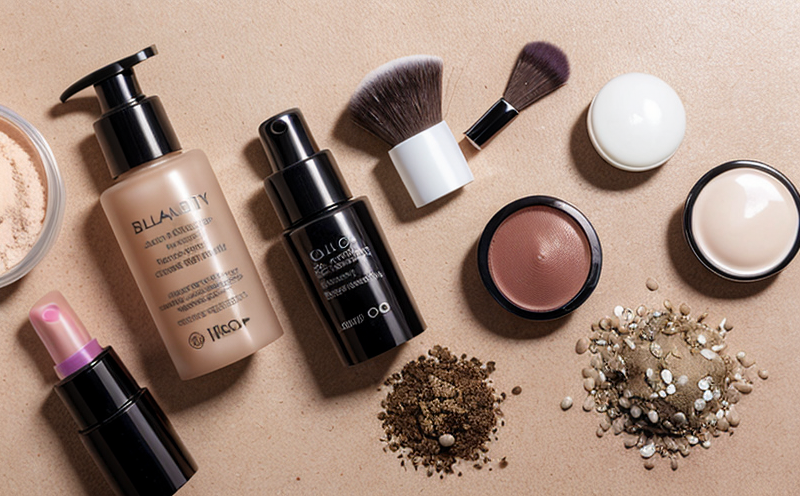Biodegradability Testing of Botanical Extracts in Cosmetics
The testing and evaluation of biodegradability within cosmetics, particularly focusing on botanical extracts, is a critical component of modern quality management. This service ensures that the ingredients used in cosmetic products do not persist indefinitely in the environment, thereby mitigating potential harm to ecosystems and biodiversity.
In the quest for sustainable formulations, it is paramount to assess how botanical extracts, which are increasingly being sourced from renewable natural resources, behave when exposed to biodegradation processes. This evaluation helps ensure that these extracts contribute positively to environmental health without compromising product efficacy or safety.
The testing methodology employed by our laboratory aligns with international standards such as ISO 14679:2018 and ASTM D5338-08, which provide clear guidelines for simulating the conditions under which biodegradation occurs in natural environments. Our approach involves subjecting samples to controlled aerobic or anaerobic digestion processes that mimic those found in soil or water bodies.
Understanding the degradation profile of botanical extracts is not only about compliance but also about innovation within product development cycles. By leveraging this service, companies can refine their formulations to enhance sustainability and meet stringent regulatory requirements effectively. The insights gained from these tests help guide R&D efforts towards more eco-friendly alternatives without sacrificing performance or consumer satisfaction.
For instance, when evaluating a new extract, we first conduct an initial characterization to understand its chemical composition and molecular structure. This information is crucial for predicting how the extract might interact with various biodegradation enzymes present in soil microorganisms. Following this, samples are exposed to defined test conditions where their mass loss over time is measured accurately.
The results from these tests provide valuable data points that inform decisions regarding ingredient sourcing and formulation adjustments. They also enable brands to communicate transparently about the environmental impact of their products, fostering trust among consumers who increasingly prioritize sustainability in their purchasing choices.
In conclusion, biodegradability testing is an essential tool in advancing environmentally responsible cosmetic manufacturing practices. By incorporating this service into your product development process, you can ensure that every ingredient used contributes positively to a greener future while maintaining the highest standards of quality and safety.
Scope and Methodology
| Aspect | Description |
|---|---|
| Sample Preparation | Samples must be prepared according to ISO 14679:2018 guidelines, ensuring they represent the true nature of the botanical extract used in cosmetics. |
| Test Conditions | Aerobic or anaerobic digestion conditions are simulated based on expected natural environments where the product might be disposed. Temperature ranges from 30°C to 37°C with controlled humidity levels. |
| Mass Loss Measurement | The mass of samples is periodically weighed using high-precision analytical balances capable of detecting minimal changes, ensuring accurate measurement. |
| Microbial Activity Monitoring | Microorganisms present in the test environment are monitored to assess their role in breaking down the botanical extracts. This helps understand the biological factors influencing degradation rates. |
International Acceptance and Recognition
The importance of biodegradability testing cannot be overstated, especially given its increasing relevance across global markets. Many countries have implemented regulations mandating the use of such tests to ensure that cosmetics are safe for both human health and environmental sustainability.
For example, the European Union's REACH regulation requires manufacturers to provide evidence demonstrating that their products meet specific biodegradability criteria before they can be sold within EU member states. Similarly, China has introduced its own set of standards requiring similar assessments for certain categories of cosmetic ingredients.
The United States also places significant emphasis on sustainability practices in cosmetics through various initiatives and voluntary programs supported by federal agencies like the Environmental Protection Agency (EPA). These efforts reflect a broader trend towards more responsible consumption patterns globally, driven by growing public awareness about environmental issues.
By adhering to these international standards during biodegradability testing, companies can stay ahead of regulatory changes and maintain compliance with evolving market expectations. This proactive approach not only enhances brand reputation but also supports long-term business growth in an increasingly competitive industry landscape.
Environmental and Sustainability Contributions
The results obtained from biodegradability testing play a crucial role in promoting sustainable practices within the cosmetics sector. When botanical extracts used in cosmetic formulations demonstrate good biodegradability, it signifies that they pose minimal risk to aquatic ecosystems if accidentally released into waterways.
This attribute is particularly important considering the significant volume of wastewater generated by personal care product manufacturing processes. Ensuring that these byproducts break down rapidly upon reaching natural environments helps prevent pollution and supports healthier aquatic habitats.
Moreover, biodegradability testing contributes to reducing dependency on non-renewable resources by encouraging the use of renewable botanical materials in cosmetic formulations. This shift towards greener alternatives aligns with broader global efforts aimed at mitigating climate change impacts associated with traditional manufacturing methods.
The data derived from these tests also informs ongoing research into developing new technologies capable of enhancing biodegradability without compromising product quality or effectiveness. Such advancements could lead to breakthrough innovations that further benefit both the environment and consumers alike.
In summary, biodegradability testing is more than just a compliance requirement; it represents an opportunity for industry leaders to drive positive change through responsible sourcing and production practices. By embracing this service wholeheartedly, companies contribute significantly towards fostering a sustainable future for all.





